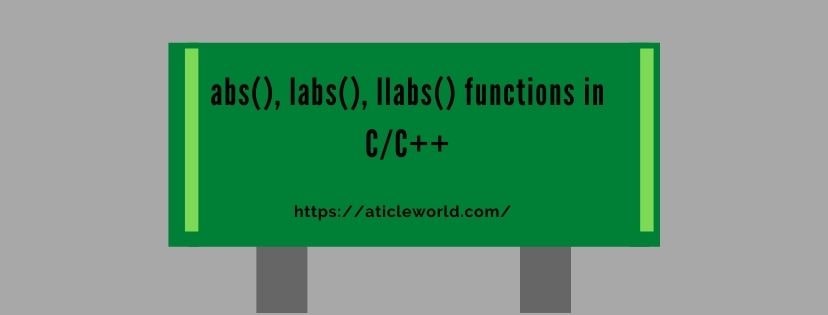The abs, labs, llabs functions compute the absolute value of an integer. These functions abs, labs, llabs are defined in stdlib.h header file.
The behavior of these functions is undefined if the result cannot be represented by the return type. So let see these function one by one with some example code.
abs():
The abs functions take an int as an argument and compute its absolute value. Let’s see the syntax of the abs function.
//Syntax of abs function. int abs(int i);
Parameters:
i— integer value
Return:
The abs function returns the absolute value ‘i’ if it is representable.
Let’s see an example code to understand the functionality of the abs in C. In this C code, I am calculating the absolute value of given int value.
#include <stdio.h>
#include<stdlib.h>
int main()
{
//passing 27
printf("abs(27) = %d\n", abs(27));
//passing -27
printf("abs(-27) = %d\n", abs(-27));
return 0;
}
When you run the program, the output will be:

Now let’s see another example where I want to compute the absolute value INT_MIN (Min integer value).
#include <stdio.h>
#include<stdlib.h>
#include <limits.h>
int main()
{
//INT_MIN the max value store by
//integer variable
printf("%d\n", abs(INT_MIN));
return 0;
}
When you run the program, the output will be:
The program behavior is undefined because of the absolute value of INT_MIN is out of range of positive integer number.
labs():
The labs functions take an long int as an argument and compute its absolute value. Let’s see the syntax of the abs function.
//Syntax of labs long int labs(long int i);
Parameters:
i— long int value
Return:
The labs function returns the absolute value ‘i’ if it is representable.
Below is the sample C program to show the working of labs() function.
#include <stdio.h>
#include<stdlib.h>
int main()
{
//passing 12345
printf("labs(12345) = %ld\n", labs(12345));
//passing -12345
printf("labs(-12345) = %ld\n", labs(-12345));
return 0;
}
Output:
labs(12345) = 12345 labs(-12345) = 12345
Now let’s see another example where I want to compute the absolute value LONG_MIN (Min value of long integer).
#include <stdio.h>
#include<stdlib.h>
#include <limits.h>
int main()
{
//LONG_MIN the max value store by
//integer variable
printf("%ld\n", labs(LONG_MIN));
return 0;
}
When you run the program, the output will be:
The program behavior is undefined because of the absolute value of LONG_MIN is out of range of a positive long int.
llabs():
The llabs functions define in C99 and onwards. It takes a long long int as an argument and computes its absolute value. Let’s see the syntax of the llabs function.
//syntax of llabs long long int llabs(long long int j);
Parameters:
i— long long int value
Return:
The llabs function returns the absolute value ‘i’ if it is representable.
#include <stdio.h>
#include<stdlib.h>
int main()
{
//passing 9876543210
printf("llabs(9876543210) = %lld\n", llabs(9876543210LL));
//passing -9876543210
printf("llabs(-9876543210) = %lld\n", llabs(-9876543210LL));
return 0;
}
Output:
llabs(9876543210) = 9876543210 llabs(-9876543210) = 9876543210
Now let’s see another example where I want to compute the absolute value LLONG_MIN (Min value of long long int).
#include <stdio.h>
#include<stdlib.h>
#include <limits.h>
int main()
{
//LLONG_MIN the max value store by
//integer variable
printf("%lld\n", llabs(LLONG_MIN));
return 0;
}
When you run the program, the output will be:
The program behavior is undefined because of the absolute value of LLONG_MINis out of range of a positive long long int.
Recommended Articles for you:
- Best Gifts for the programmer and techies.
- fabs function in C.
- How to use and implement your own strcat in C.
- How to implement atoi in C/C++;
- Use and create strspn in programming.
- How to make memcpy function in C
- memmove vs memcpy.
- Implement vector in C.
- How to Use strncpy() and implement own strncpy().
- How to pass an array as a parameter?
- 10 Best C Programming Books.
- Best mouse for a programmer.
- Memory Layout in C.
